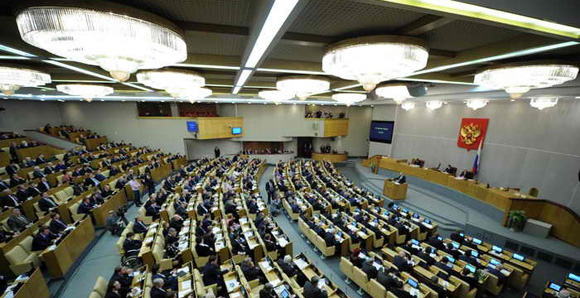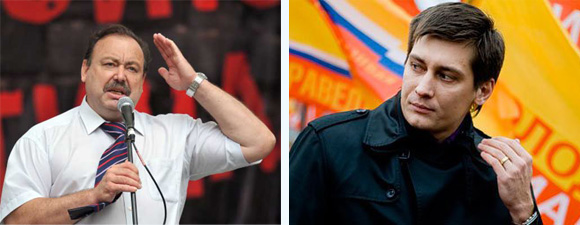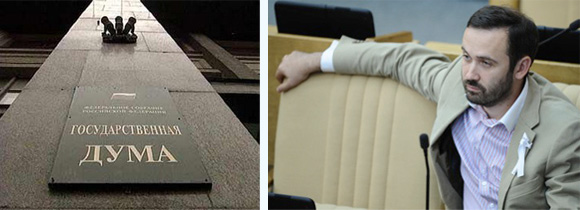The protest sentiments manifested in recent months at mass rallies across Russia have reached the halls of the State Duma which had long ceased to be a “place for discussion.” Just three opposition lawmakers – Gennady Gudkov, Dimitri Gudkov, and Ilya Ponomarev – restored the half-forgotten atmosphere of parliamentary debates to the Duma chamber. The authorities, not surprisingly, are not tolerating this situation: Gudkov Sr. has already been expelled from parliament, while Ponomarev has been deprived of the right to speak (so far, for one month). IMR Advisor Vladimir Kara-Murza discusses the prospects for dissent in the Russian legislature.

The year 2003 was a turning-point in Russia’s transition to authoritarianism. Although the answer to the question “Who is Mr. Putin?” had become evident long before (the creation of the “vertical of power” and the return of the Stalinist national anthem date from 2000, while the independent NTV television was seized by the state in 2001), it was 2003 that saw three key events which solidified the repressive trend. In June, the press minister took TVS, Russia’s last nationwide independent television channel, off the air, explaining his decision as “protecting viewers’ interests.” In October, Mikhail Khodorkovsky was arrested: the infamous Yukos affair would signal a ban on independent political and civic activities for business, and would destroy any remaining illusions about the Russian judiciary’s independence. Finally, in December, elections which, according to the OSCE, failed to meet democratic standards, resulted in an opposition-free parliament: the Fourth State Duma which, as aptly described by its speaker, Boris Gryzlov, was “not a place for discussion.”
Officially, of course, a “parliamentary opposition” continued to exist: it included the familiar Stalinists from the Communist Party, the nationalist LDPR, which supported the Kremlin in all key issues, and the Motherland bloc, created with Putin’s backing. But the democratic alternative to the authoritarian course was removed: according to the official results, neither Yabloko nor the Union of Right Forces (both of which were supported by Khodorkovsky – this, in fact, had been his real “crime”) passed the 5 percent threshold necessary to gain seats. Although a parallel vote count conducted by, of all people, the Communists showed that Yabloko, with 5.7 percent of the vote, was entitled to enter parliament; the Central Electoral Commission was adamant: 4.3 percent for Yabloko and not a vote more. That same Duma would obediently (and, indeed, without much “discussion”) rubberstamp Putin’s 2004 counter-reforms which abolished direct gubernatorial elections and single-member district elections for the Duma. This last change allowed the authorities to “cleanse” the chamber in 2007 of the few remaining independent lawmakers (including Vladimir Ryzhkov) who had managed to be elected and seated in 2003.
The 2011 election was intended to be the most controlled vote under Putin: nine opposition parties had been denied registration in advance, state television ensured the “correct” coverage of the campaign, and votes were counted by the long-established “vertical” of electoral commissions. Yet, this time, the administration miscalculated. At some point, every nondemocratic regime crosses the line between passive discontent and active protest. For Putin’s regime, this point came in December 2011 when public outrage over a “stolen” election led to mass opposition rallies in downtown Moscow. According to expert estimates, the ruling United Russia party’s results were inflated by 14 million phantom “votes.”
The echo of these protests reached the “cleansed” parliament. Three lawmakers – Gennady Gudkov, his son Dmitri Gudkov, and Ilya Ponomarev – sided with the protest movement. All three entered the Duma on the list of A Just Russia, a party created by the Kremlin as a pseudo alternative to United Russia. Before the 2011 election, experts predicted that A Just Russia will suffer a defeat or, at best, receive one or two “consolation” seats. But the party seemed to have been the main beneficiary of the opposition campaign “Not a single vote to United Russia!” urging voters to back any list except that of the ruling party. In the end, A Just Russia officially received 13.2 percent of the vote and 64 parliamentary seats. It should be noted that both Gudkov Sr. and Ponomarev had been members of the previous Duma, where they were not known for their opposition stance and where, along with their party colleagues, they voted to confirm Putin as prime minister. With 44 percent of Russians backing the post-election protests, however, circumstances changed and dissent spread even inside Putin’s Duma.

Lawmakers Gennady Gudkov (left) and Dmitry Gudkov
The three “rebels” have fiercely criticized the Kremlin’s repressive laws and managed to turn parliament back into a “place for discussion.” The law which we are adopting today is another step toward degrading our civil society,” Ilya Ponomarev declared as the Duma was considering a measure that forces NGOs which receive funding from abroad to register as “foreign agents,” “It is a step that sets one group of Russian citizens and patriots against another group of Russian citizens and patriots.” The law on public rallies which raised the maximum fine for “violations” by a factor of 150 drew equally stern criticism. “The authorities are going from individual repression, the mindless and stupid arrests of opposition leaders, the firing of dissenters from television channels, and the persecution of business to shooting in the squares,” warned Gennady Gudkov, “After falsifying elections and showing that you cannot achieve anything by elections, the opposition was left only with the street… Now you are taking away the street, which will mean that the protests will radicalize, go underground, and we know what that will lead to. The tightening of the screws in Russia has always led to bloodshed.”
It took the Duma eleven hours to vote on the new law on rallies: a group of lawmakers led by Dmitri Gudkov organized Russia’s first-ever parliamentary filibuster, forcing the chamber to debate more than 400 amendments. During the passage of the law that recriminalized “slander” Ponomarev, speaking from the Duma rostrum, urged “crooks and thieves” not to vote for the bill (“the party of crooks and thieves” is the popular nickname for United Russia). Yet it was Gudkov Jr. who went furthest when he came out in support of the U.S. Congress adopting the Magnitsky Act – a measure that draws the most ire from the Kremlin. As Boris Nemtsov asserted at a June rally, the three “rebels” “have saved parliament’s reputation.”
The real politics in today’s Russia — just as in all authoritarian countries — is not found in manipulated elections or a puppet parliament, but in the streets
It was clear, however, that the Kremlin would not tolerate even the slightest dissent in the Duma. In June, the ethics commission recommended that the two Gudkovs and Ponomarev resign their seats on the grounds that their participation in protest rallies constituted “a violation of ethical norms which denigrates the status of a member of the State Duma, [and] undermines the authority of the legislative branch.” (Back in 2001, ignoring even the formal separation of powers, President Putin personally demanded that opposition leader Nemtsov resign his parliamentary seat. Needless to say, Nemtsov refused).
In July, United Russia lawmakers proposed new rules that would allow the Duma to expel any member for “inappropriate statements which discredit parliament or are directed against the state.” “Naturally, such people as Ilya Ponomarev and the Gudkovs, who bring a dissonance to the Duma, who express opposition and discontent and participate in protest rallies, are a foreign element in the Duma,” observed political analyst Lilia Shevtsova, “After the regime chose a course of repression, and after the Duma, on Kremlin instructions, annulled constitutional protections for the freedom of assembly and freedom of speech, it would be strange for the Duma to tolerate maverick lawmakers.”
In the end, a change of rules was not required: on September 14th the State Duma expelled Gennady Gudkov from its ranks at the request of the Prosecutor General for allegedly running a business while being a member of parliament. Similar allegations against United Russia lawmakers did not seem to interest the prosecutors; as Peruvian dictator Óscar Benavides once remarked, “For my friends, anything; for my enemies, the law.” Not that anyone tried to hide the real reasons for the expulsion: as Gudkov was leaving the rostrum, United Russia member Vladimir Pekhtin called him a “Judas”. This epithet embodies what is perhaps the regime’s greatest fear: not that opposition speeches will be heard in parliament, but that former regime figures like Gennady Gudkov (a KGB Colonel and former member of the United Russia caucus), will defect to the growing opposition.

Ilya Ponomaryov (right) — Russian left-wing politician, entrepreneur, and activist, 5th and 6th State Duma Deputy, member of Just Russia faction, and member of Left Front Council
On September 24th, the Duma ethics commission (headed by Pekhtin) recommended that another “rebel,” Ilya Ponomarev, be deprived of the right to speak in the chamber between October 16th and November 16th. The seemingly illogical delay is due to the fact that in November the Duma will debate the 2013 budget; thus, one of the two remaining opposition lawmakers will not get a chance to speak on it. The decision to silence Ponomarev for a month is considered by many as a warning: United Russia deputies had previously hinted that he may be barred from speaking for the duration of the current Duma’s term. Dmitri Gudkov remains the only “rebel” who has yet to be officially sanctioned; he now refers to himself as “still a member of parliament.”
It is likely that the Duma will soon rid itself of the few dissenting voices, and that Putin’s parliament will return to its normal state of “no discussion.” But this is of little consequence. As the events of the past year have shown, the real politics in today’s Russia – just as in all authoritarian countries – is not found in manipulated elections or a puppet parliament, but in the streets and squares. After all, it was a 100,000-strong rally on Bolotnaya Square – not lawmakers – that forced the Kremlin to reinstate gubernatorial elections and register opposition parties.
The illegitimate Duma is perhaps the weakest spot of the current regime. Not only is it illegitimate (all the post-2003 Dumas were illegitimate), but its lack of legitimacy is evident to all the political players and the active part of Russian society. The continuing protests are only the tip of the iceberg. Even Mikhail Dmitriev, the president of the Kremlin-friendly Center for Strategic Research (its board of trustees is chaired by Deputy Prime Minister Dmitri Kozak), is forecasting an early parliamentary election in 2015 and “does not exclude” an opposition victory.
Early elections – the principal demand of all the ideological flanks of the Russian opposition – may take place even earlier. The parliament that will result may become much more than just “a place for discussion.” After all, Russia has had genuinely free parliaments before (for instance, the State Duma between 1906 and 1917 and between 1993 and 2003). What Russia has never had is a powerful parliament that would not just debate but would actually govern the country. Judging by the prevailing sentiments of today’s opposition, post-Putin Russia will be a parliamentary (at most, a mixed parliamentary-presidential) republic. As Andrei Piontkovsky, one of the protest movement’s intellectual leaders, has emphasized, “Our goal is not to replace bad Czar Putin with good Czar [Alexei] Navalny. Our goal is to finally abolish the position of Czar in Russia.”

